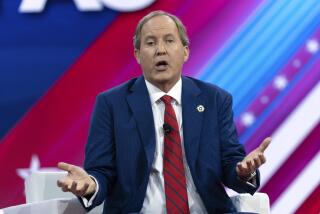So what’s illegal?
I first heard the term from a liberal activist who was warning of the evils that would befall the nation because of George W. Bush’s appointees on the Supreme Court. Bush justices would be bad not only for women and minorities, she argued, but also for “undocumented citizens.”
Huh? “Undocumented citizens”? The linguistic purist in me balked. Unlike “undocumented immigrants,” the genteel euphemism for “illegal aliens,” the phrase “undocumented citizens” was a contradiction in terms.
But as a Freudian slip it made sense. The speaker, despite her professions of homage to the rule of law, deep down probably thought that the distinction between an illegal immigrant and a citizen was a technicality. It was the same sentiment behind T-shirts at last year’s immigration rally in Los Angeles that said: “I’m illegal. So what?”
“Undocumented citizen” has been popping up in other places. Homeland Security Secretary Michael Chertoff, whose portfolio includes immigration, was asked at a conference in February about congressional restrictions that made it hard for social-service agencies to serve “undocumented citizens.”
Chertoff didn’t call the questioner on his inaccuracy, but the phrase has offended the ears of some conservatives. TV talk show host Glenn Beck had some fun recently with a Florida legislator who wants to abolish the term “illegal alien,” which she says “makes people think of beings from outer space.” (Really?) Her preferred term: That’s right, “undocumented citizens.”
This war of words over what to call 12 million non-citizens is more than another example of loose-talking liberals providing ammunition to conservative critics of “political correctness.” Semantics aside, liberals on immigration reforma group in which I count myselftoo often give short shrift to the problem posed for many Americans by the fact that illegal aliens broke the law.
Opponents of a “path to citizenship” for illegal aliens certainly include racists, xenophobes and hypocrites who benefit from the fruits of foreign labor. But they also include Americans who have imbibed the importance of the “rule of law” from civics class and classics like Twelve Angry Men.
Tuesday was not only May Day but Law Day, and that obscure observance proved an irresistible opening for Bush-bashing. A New York Times editorial sniffed that “President Bush has issued a proclamation inviting Americans today to ‘celebrate the Constitution and the laws that protect our rights and liberties.’ It rings more than a little hollow, though, as he continues to trample on civil liberties in the war on terror...”
Ruth Marcus suggested (rightly) in a column in the Washington Post that Bush’s Law Day proclamation was mocked by his administration’s attempt to restrict contacts between inmates at Guantanamo and their lawyers.
Missing from both of these broadsides was any mention of what some critics consider the worst example of Bush’s lack of seriousness about the rule of law: his willingness to offer illegal aliens a path to citizenship. Yet much opposition to immigration reform is rooted in the same American punctiliousness about obeying the law that animated liberal attacks on Bush for wiretapping Americans without seeking a court order.
Bush’s defenders said he was subordinating the rule of law to a higher goodpreventing another 9/11. A similar tradeoff is involved in winking at immigration violations in the cause of the greater good of family unification or sanctuary for strangers. Yet Bush’s wiretaps were “illegal” while people who violate the immigration laws are “undocumented.”
Actually, Bush’s approach to immigration is at war with itself. He wants to legalize immigrants who have made lives for themselves here while tightening border controls to prevent others from improving their situation in the same way. He attempts to square that circle by saying that illegal aliens must pay a “meaningful penalty.” Current reform proposals in Congress contain a “touchback” provision that would require illegal aliens seeking permanent status to leave the United States and then return.
Programmatically, “touchback” is a silly and even self-defeating idea. Politically, it may be the price Bush and other reformers will have to pay, not because Americans are bigoted or inhospitable but because they’re not willing to say: “Illegal? So what?”
Michael McGough is The Times’ senior editorial writer. Send us your thoughts at [email protected].
More to Read
A cure for the common opinion
Get thought-provoking perspectives with our weekly newsletter.
You may occasionally receive promotional content from the Los Angeles Times.











